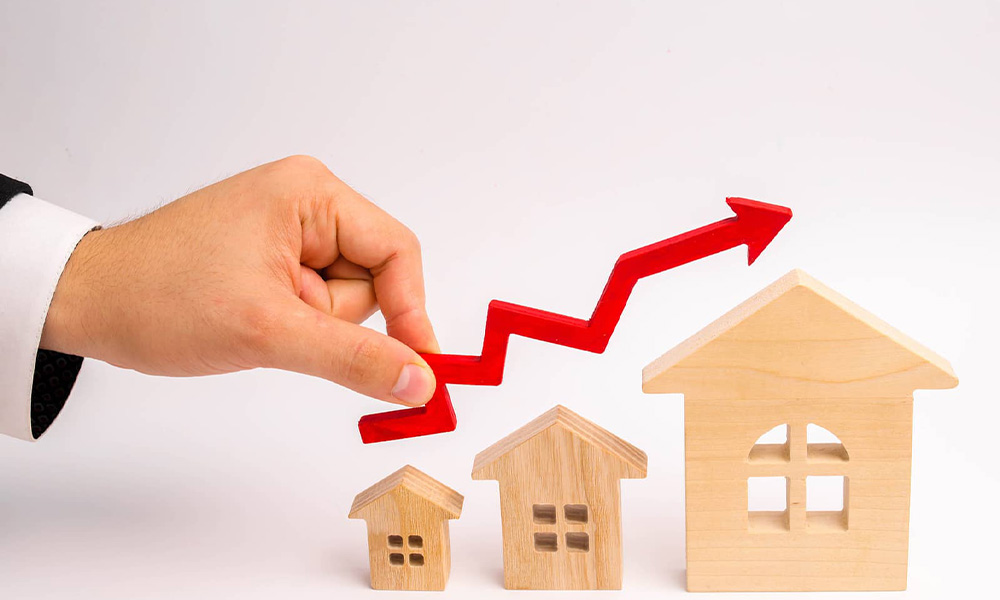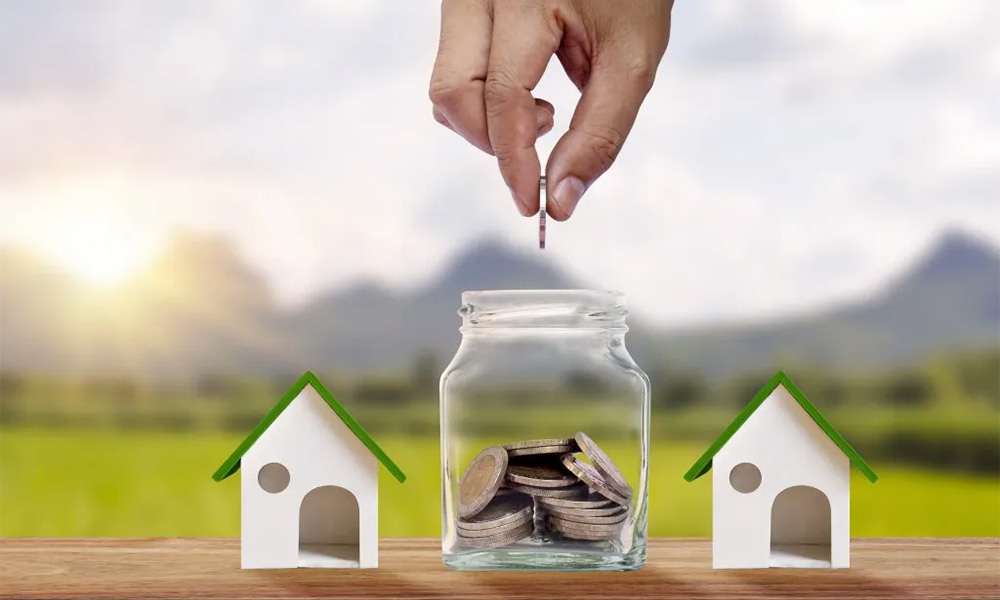If you are looking for a sound investment that can provide financial security and peace of mind, real estate may be the perfect option. Real estate appreciation can be a great way to build wealth and achieve financial security. It is a significant factor in the long-term profitability of real estate investing. Of course, there are also risks associated with investing in real estate. It is essential to do your research and understand the risks before you invest. However, if you are prepared to take on the risks, real estate can be a very rewarding investment.
In this blog post, we will discuss real estate appreciation, factors affecting appreciation and average appreciation on real estate investment.
What is Appreciation in Real Estate?

Real estate appreciation is the increase in the value of a property over time. In simpler terms, it’s like your house becoming more valuable as the years go by. This can happen for various reasons and is a fundamental concept in the world of real estate.
Let’s say you buy a house for a certain amount of money, and the house’s value can go up as time goes by. People might want to live in your neighbourhood more, the area could become more popular, or the economy might get better, all of which can make your house worth more than what you paid. That house value increase is what we call real estate appreciation. It’s a good thing for homeowners because it means they could sell their house for more money than they bought it for, potentially making a profit.
Various factors, such as market dynamics and inflation, influence real estate appreciation. Among these factors, demand plays the most pivotal role; when real estate demand surpasses its supply, property values surge. Real estate appreciation aims to gauge how much a property’s value has increased with time, offering valuable insights to investors contemplating property acquisition, sale, or retention.
How Do We Measure Appreciation?
One way to measure this appreciation is by examining the price change of a property over different periods. For instance, if a property was initially purchased for $100,000 and is currently valued at $120,000, it has appreciated by $20,000. Historical charts depicting real estate appreciation over time serve as valuable tools for economists and analysts to understand how property values have evolved. These charts can also serve as predictive tools for future trends.
Why Does Real Estate Appreciation Matter?
Understanding real estate appreciation is essential for a few reasons:
Investment: Many people buy real estate as an investment. They purchase properties with the hope that their value will increase over time, allowing them to sell at a profit or generate rental income.
Homeownership: If you own a home, real estate appreciation can be a significant financial benefit. As your property appreciates, it can build wealth and provide financial security for your future.
Planning: Knowing how property values change in your area can help you make informed decisions about buying, selling, or upgrading your home.
Factors Affect Home Appreciation
Let’s break down the key factors that contribute to real estate appreciation:
Location: One of the most important factors in real estate appreciation is the location of the property. If your home is in an area that’s in high demand, such as a bustling city or a neighbourhood with good schools and amenities, its value is likely to go up. Think of it like this: more people want to live there, so the price goes up.
Economic Growth: Areas experiencing economic growth tend to see an increase in property values. When new businesses move in, job opportunities increase, and the overall quality of life improves, which can ultimately drive up real estate prices.
Supply and Demand: Just like any other commodity, real estate is subject to the laws of supply and demand. If there are more buyers than available properties, prices tend to rise. Conversely, if there’s an oversupply of properties, prices may stay stagnant or even decrease.
Home Improvements: Sometimes, homeowners make improvements or renovations to their properties. This can include upgrading kitchens, bathrooms, or landscaping. These enhancements can significantly increase a property’s value.
Inflation: Over time, the general increase in the cost of goods and services (inflation) can lead to higher real estate prices. It takes more money to buy the same property in the future, so property values rise accordingly.
Interest Rates: The cost of borrowing money (interest rates) can affect real estate appreciation. When interest rates are low, more people can afford to buy homes, which can drive up demand and prices.
Historical Trends: In some cases, historical trends play a role in real estate appreciation. Certain neighbourhoods or cities have a history of consistent property value growth, making them attractive to investors.
Average Appreciation of Real Estate In Pakistan
Real estate is a very important industry in Pakistan that contributes a lot to the country’s economy. The construction business is growing fast, and it’s a good chance to make your properties worth more. But last year, when they changed the tax rules, it slowed things down a bit. However, experts think that 2023 will be a great year for real estate in Pakistan.
Pakistan’s building and construction sector adds a lot of money to the country’s economy every year, about $314 billion. In 2022, the real estate industry made $13.8 billion in the first nine months. Compared to other important industries like farming, technology, energy, and making things, real estate is a strong business with good growth potential. In the 2022-23 budget, the government increased the taxes a bit for both people who pay their taxes on time (filers) and those who don’t (non-filers).
This year, the Pakistan Bureau of Statistics thinks the building and construction business is worth somewhere between $300 billion and $400 billion, which is about 2% of Pakistan’s total money. This industry may not seem like a big deal, but it actually has a quiet impact on the country’s economy. So, it’s the best time to invest in the real estate market in 2023.
Benefits Of Real Estate Investment

Investing in real estate has many advantages. When you choose the right properties, you can make money from regular rent, get good returns, enjoy tax benefits, and reduce risk by spreading your investments. You can also use real estate to grow your wealth over time.
Here’s what you need to know about the benefits of real estate investment:
Making Money: Real estate investors earn money through rent, property value increases, and profits from property-related businesses.
Cash Flow: This means the money you have left after paying your mortgage and other expenses. It often grows as you pay off your mortgage.
Tax Benefits: Real estate investors can lower their taxes by deducting property-related costs from their income. You can also defer capital gains tax through a 1031 exchange.
Property Value Increase (Appreciation): Over time, real estate values tend to go up, allowing you to profit when you sell. Rents also typically increase, leading to higher income.
Building Wealth: Paying down a property’s mortgage builds equity, which adds to your overall wealth. As you accumulate equity, you can buy more properties and increase your income further.
Diversification: Real estate can be a good way to diversify your investments because its value doesn’t always move in sync with stocks and other assets. This can reduce the overall risk in your investment portfolio.
Leverage: You can use borrowed money to invest in real estate, which can magnify your potential returns. For example, a small down payment can allow you to buy a much more expensive property.
Competitive Returns: Real estate returns can be competitive with stock market returns, depending on the location and type of property.
Inflation Hedge: Real estate can help protect your money against inflation because property values and rents tend to rise as the economy grows.
Tips For Real Estate Investment
Here are some tips for using real estate appreciation to your advantage:
- Buy in a desirable location: The location of a property is one of the most important factors in its value. Choose a location that is in high demand and has good growth potential.
- Make improvements to the property: As mentioned above, improvements to a property can increase its value. Make sure to make improvements that will appeal to potential buyers.
- Hold the property for the long term: Real estate appreciation is a long-term investment. Hold the property for as long as possible to maximize your gains.
- Refinance or sell when the time is right: If you need cash or want to realize your gains, you can refinance or sell the property when the time is right.
If you want to become a real estate agent, read our blog: How to Become a Successful Real Estate Agent? 13 Useful Tips
Conclusion
Real estate appreciation in Pakistan presents a promising opportunity for investors and homeowners alike. It is a dynamic concept that reflects the increase in property values over time, driven by various factors such as location, economic growth, supply and demand dynamics, home improvements, inflation, interest rates, and historical trends. Understanding and leveraging real estate appreciation can lead to numerous benefits, including financial stability, wealth accumulation, tax advantages, and portfolio diversification.

